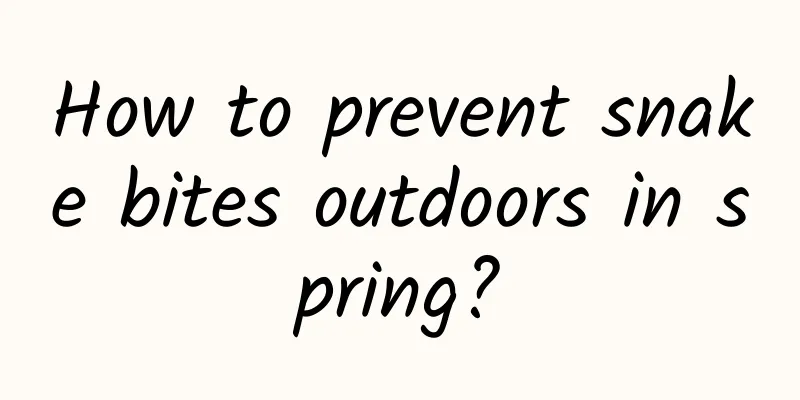How to prevent snake bites outdoors in spring?

|
How to prevent snake bites when doing outdoor activities or working in spring In spring, everything comes back to life. However, as the temperature gradually rises, snakes also become active. When doing outdoor activities or working, how to prevent snake bites and protect your own safety has become an issue that we must pay attention to. This article will provide you with a detailed scientific guide from the aspects of snake characteristics, prevention measures and emergency treatment. 1. Know snakes, know yourself and know your enemy First of all, we need to have a basic understanding of snakes. Snakes are reptiles. There are more than 3,340 species in the world, including more than 660 venomous snakes and nearly 200 deadly venomous snakes. In my country, there are more than 200 species of snakes, including more than 60 venomous snakes and more than 10 highly venomous ones. Common ones include cobras, bungarus, kraits, pit vipers, and bamboo pit vipers. Most of these venomous snakes have bright body colors and special markings, but some venomous snakes are not conspicuous in appearance, so we cannot judge whether a snake is venomous based on appearance alone. When preventing snake bites, we need to understand the activity habits of snakes. Generally speaking, snakes like to live in hidden places such as grass, woods, and rock crevices, especially in the early morning and dusk, when they are most active. In addition, snakes are very sensitive to vibration and heat, so we should try to avoid making loud noises or vibrations when walking or working. 2. Preventive measures, step by step After understanding the basic characteristics of snakes, we need to take a series of preventive measures when we are outdoors or working. Wear protective clothing: Wear long pants and long-sleeved clothing to avoid exposing too much skin, which can reduce the risk of snake bites. Choose high-top shoes or hiking boots to protect the ankles, and avoid wearing sandals or slippers, which may not effectively protect the feet. In addition, high-risk occupations in high-incidence areas are recommended to use protective clothing to reduce the risk of snake bites. Lighting and detection: Use a light when moving at night or in dimly lit areas. When crossing grass, bushes, and other places where snakes may live, tap the ground with a stick to drive away any snakes that may be hiding there. Behavior: When walking in the mountains or outdoors, try to stay quiet and avoid sudden movements or loud noises. Snakes are very sensitive to sudden noises and movements, and may be frightened and attack. Also, try to avoid touching unknown objects or plants with your hands to avoid accidentally touching snakes. Camping and resting: When camping in areas where snakes are present, you should choose to set up your tent in an open, dry area away from the grass. When resting, try to sleep on a bed and under a well-tied mosquito net, and avoid sleeping directly on the ground or near the grass. In addition, snakes are easily attracted to food, so it is recommended to separate the rest area from the dining and food storage area. Lifestyle habits: Change bad lifestyle habits, such as collecting firewood at night and urinating and defecating in the open, as these behaviors may increase the risk of snake bites. 3. Emergency handling, calm response Although we can take a series of preventive measures, if we are unfortunately bitten by a snake, we also need to know how to deal with it in an emergency. Leave the scene: Immediately leave the area where you were bitten and avoid further contact with the snake. Remember, do not try to catch or kill the snake that bit you, as doing so may worsen the injury or cause more danger. Stay calm: After being bitten by a snake, you must stay calm and avoid excessive panic or excitement. Emotional excitement may cause blood circulation to increase, thereby accelerating the spread of venom. Reduce activity: Try to keep the bite site still to avoid excessive movement that may cause the venom to spread. If possible, you can use a bandage or cloth to tie it tightly above the wound to slow down the spread of the venom. But please note that the force of the tie should be moderate so as not to affect blood circulation. Seek medical assistance: Seek medical help as soon as possible and seek professional medical help. During the medical treatment, try to keep the wound clean and dry to avoid infection. 4. Misconceptions and Rumors In the process of preventing snake bites, we also need to be wary of some common misunderstandings and rumors. "Judging a snake by its appearance" is not accurate: while some venomous snakes have unique appearance features, such as triangular heads and bright colors, not all venomous snakes have these features. Therefore, we cannot judge whether a snake is venomous based on its appearance alone. Blindly applying medicine is not advisable: Some people will blindly apply some Chinese herbal medicine or other medicine after being bitten by a snake. However, this practice may cause wound infection or aggravate the injury. The correct approach is to seek medical treatment as soon as possible and receive professional treatment. Ignore occasional incidents: Some snakes may spray venom when threatened or frightened, so we should be extra careful when handling snakes. In addition, venomous snakes that have been soaked in alcohol for a long time may just be in suspended animation, so be careful when handling dead venomous snakes. In short, preventing snake bites requires us to be fully prepared and take preventive measures. When doing outdoor activities or working, we should remain vigilant, understand the characteristics and habits of snakes, and take effective preventive measures. At the same time, we also need to master the correct emergency treatment methods so that we can respond calmly and reduce the damage when we are unfortunately bitten by a snake. Through scientific knowledge and correct behavior, we can effectively reduce the risk of snake bites and ensure our own safety. |
<<: "China's Sky Eye" has made new discoveries!
>>: "I hope you are well, but I don't want you to be too well", why do we envy others?
Recommend
Summer is coming, is it reliable to lose weight by sleeping?
Summer is coming, and losing weight is becoming a...
How much does it cost to develop a small program for geotechnical building materials in Xing'an League?
The development of the Xing'an League geotech...
What is the value of KOL? How do operators tap into KOLs?
KOL is a concept in marketing , which means key o...
Is it safe to buy clothes through mini programs? Is it reliable to buy things from the mini program mall?
Is it safe to buy clothes through mini programs? ...
Tips for developing core keywords for hospital websites!
The customization of core keywords for hospital w...
Second-tier e-commerce marketing | Secrets to creating hot-selling products in the jewelry and watch industries!
In the past two years, jewelry, accessories and w...
Have you not yet distinguished between "fog" and "haze"?
Is it fog or haze? Environmental Science Autumn a...
Forget about octa-core phones! Is the quad-core Snapdragon 820 really good enough to stand out from the crowd?
In recent years, device manufacturers have been te...
What would the world be like without Android?
A piece of news that Kodak will join hands with a...
Following the light: He uses "photon imaging" to illuminate the biological world!
Fireflies are always an indispensable part of sum...
A must-read for marketers! The underlying logic of hot products
What is a hot product? This is a good question an...
Valuation Modeling Skills Enhancement Course 5
Whether it is a written interview or an internshi...
Me, a mobile phone driven crazy by remote work
Hello everyone, this is Wang Xueli’s cell phone. ...
A new weight loss theory! “Eating less at night” is not reasonable? Except for these people
After the Mid-Autumn Festival, everyone must have...
WeChat is lowering the overall IQ of Chinese society
Editor's note: The existence of the Internet m...









